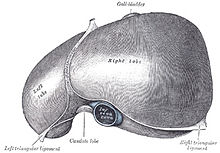כבד
Hello, you have come here looking for the meaning of the word כבד. In DICTIOUS you will not only get to know all the dictionary meanings for the word כבד, but we will also tell you about its etymology, its characteristics and you will know how to say כבד in singular and plural. Everything you need to know about the word כבד you have here. The definition of the word כבד will help you to be more precise and correct when speaking or writing your texts. Knowing the definition ofכבד, as well as those of other words, enriches your vocabulary and provides you with more and better linguistic resources.

כבד
Aramaic
Verb
כבד • (k'vad)
- to be heavy
- to burden, or to weigh down emotionally
Hebrew
| Root |
|---|
| כ־ב־ד (k-b-d) |

Etymology 1
From Proto-Semitic *kabid- (“liver”). Cognate with Arabic كَبِد (kabid).
Noun
כָּבֵד • (kavéd, kāḇēḏ) m
- liver (organ of the body)
- Tanach, Leviticus 3:15, with translation of the Jewish Publication Society:
- וְאֵת שְׁתֵּי הַכְּלָיֹת וְאֶת־הַחֵלֶב אֲשֶׁר עֲלֵהֶן אֲשֶׁר עַל־הַכְּסָלִים וְאֶת־הַיֹּתֶרֶת עַל־הַכָּבֵד עַל־הַכְּלָיֹת יְסִירֶנָּה׃
- ve-et shtei ha-klayót ve-et ha-ḥéleḇ ashér 'aleihén ashér 'al ha-ksalím ve-et ha-yotéret 'al ha-kaḇéd 'al ha-klayót y'sirénnah.
- and the two kidneys, and the fat that is upon them, which is by the loins, and the lobe above the liver, which he shall take away by the kidneys.
- Tanach, Ezekiel 21:26, with translation of the Jewish Publication Society:
- כִּי־עָמַד מֶלֶךְ־בָּבֶל אֶל־אֵם הַדֶּרֶךְ בְּרֹאשׁ שְׁנֵי הַדְּרָכִים לִקְסָם־קָסֶם קִלְקַל בַּחִצִּים שָׁאַל בַּתְּרָפִים רָאָה בַּכָּבֵד׃
- Ki 'amad melekh Bavel el em ha-derekh, b-rosh shnei ha-drakhim, liq'sam qasem: qilqal ba-ḥitzim, sha'al ba-trafim. ra'ah ba-kaḇed.
- For the king of Babylon standeth at the parting of the way, at the head of the two ways, to use divination; he shaketh the arrows to and fro, he inquireth of the teraphim, he looketh in the liver.
- a. 217 C.E., Mishnah, Yoma 8:6:
- .מִי שֶׁנְּשָׁכוֹ כֶלֶב שׁוֹטֶה, אֵין מַאֲכִילִין אוֹתוֹ מֵחֲצַר כָּבֵד שֶׁלוֹ, וְרַבִּי מַתְיָא בֶן חָרָשׁ מַתִּיר
- Mi she-n'shakhó khélev shotéh, ein ma'akhilin otó me-ḥatzár kaḇéd sheló, v-Rábbi Mátya ven Ḥarásh matír.
- If a person was bitten by a mad dog, they may not feed him the lobe of the dog's liver, though Rabbi Matya ben Ḥarash permits it.
Declension
Declension of כָּבֵד
| Number | Isolated forms | With possessive pronouns | |||||
|---|---|---|---|---|---|---|---|
| State | Form | Person | singular | plural | |||
| m. | f. | m. | f. | ||||
| singular | indefinite | כָּבֵד | first | כְּבֵדִי | כְּבֵדֵנוּ | ||
| definite | הַכָּבֵד | second | כְּבֵדְךָ | כְּבֵדֵךְ | כָּבֵדְכֶם | כָּבֵדְכֶן | |
| construct | כָּבֵד־ | third | כְּבֵדוֹ | כְּבֵדָהּ | כְּבֵדָם | כְּבֵדָן | |
| plural | indefinite | כְּבֵדִים | first | כבדיי / כְּבֵדַי | כְּבֵדֵינוּ | ||
| definite | הַכְּבֵדִים | second | כְּבֵדֶיךָ | כבדייך / כְּבֵדַיִךְ | כְּבֵדֵיכֶם | כְּבֵדֵיכֶן | |
| construct | כְּבֵדֵי־ | third | כְּבֵדָיו | כְּבֵדֶיהָ | כְּבֵדֵיהֶם | כְּבֵדֵיהֶן | |
Etymology 2
From Proto-Semitic, cognate with Akkadian 𒂂 (kabtum), Ugaritic 𐎋𐎁𐎄 (kbd), Arabic كَبِد (kabid) and Ge'ez ክቡድ (kəbud).
Adjective
כָּבֵד • (kavéd, kāḇēḏ) (feminine כְּבֵדָה, masculine plural כְּבֵדִים)
Derived terms
- בְּלֵב כָּבֵד (b'lev kavéd)
Verb
כָּבֵד • (kavéd, kāḇēḏ) (pa'al construction)
- to be heavy, weighty, burdensome, honoured
Conjugation
Conjugation of כָּבַד (see also Appendix:Hebrew verbs)
| non-finite forms |
| ||||
|---|---|---|---|---|---|
| finite forms | singular | plural | |||
| m. | f. | m. | f. | ||
| past | first | כָּבַדְתִּי | כָּבַדְנוּ | ||
| second | כָּבַדְתָּ | כָּבַדְתְּ | כְּבַדְתֶּם1 | כְּבַדְתֶּן1 | |
| third | כָּבַד | כָּבְדָה | כָּבְדוּ | ||
| present | כָּבֵד | כְּבֵדָה | כְּבֵדִים | כְּבֵדוֹת | |
| future | first | אֶכְבַּד | נִכְבַּד | ||
| second | תִּכְבַּד | תִּכְבְּדִי | תִּכְבְּדוּ | תִּכְבַּדְנָה2 | |
| third | יִכְבַּד | תִּכְבַּד | יִכְבְּדוּ | תִּכְבַּדְנָה2 | |
| imperative | כְּבַד | כִּבְדִי | כִּבְדוּ | כְּבַדְנָה2 | |
| notes |
| ||||
Verb
כִּבֵּד • (kibéd, kibbēḏ) (pi'el construction)
Noun
כֹּבֶד • (kóved) m
References
- H3515 in Strong, James (1979) Strong’s Exhaustive Concordance to the Bible
- H3513 in Strong, James (1979) Strong’s Exhaustive Concordance to the Bible
- Caspari, Wilhelm (1908) Die Bedeutungen der Wortsippe כבד im Hebräischen [The meanings of the word kin כבד in Hebrew] (in German), Leipzig: A. Deichert’sche Verlagsbuchhandlung Nachf. (Georg Böhme)